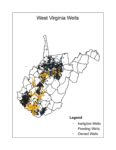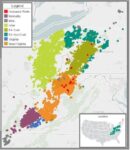 |
|
|||||||||
2018 Co-Tenancy Law Now in Effect – How Does It Affect You?Earlier this week, the “Co-Tenancy Modernization and Majority Protection Act” enacted during the 2018 legislative session, went into effect. WV-SORO has added two new pages to our website to help surface and mineral owners better understand the new law and what to do if they are affected. The 2018 co-tenancy statute includes a number of benefits and protections for surface owners, which are outlined in more detail here. For mineral owners, we have added a page which explains the provisions of the statute, the expected change in leasing dynamics that are likely to occur, and various courses of action to take if you are affected. (Read more here.) The Oil and Gas Conservation Commission has the power and to duty to execute and carry out, administer and enforce relevant provisions of the new law. In May, WV SORO made a presentation to the Commission regarding the emergency and legislative rule-making we believe is required to carry out the surface owner and small mineral interest owner protections in the bill, but also emphasizing that the Commission had broader duties and powers to “carry out, administer, and enforce . . . and make . . . investigation” regarding the new statute. Although WV SORO believes this rule-making is needed, we do not know if that will happen. In order to comply with the required steps in the rule-making process the Commission must file its proposed rule with the Secretary of State by June 27. The Commission is scheduled to meet again on June 19. Litigation UpdateWhen the surface land and mineral underneath are owned by different parties, what are the rights of a mineral owner (or their lessee/driller) to use the surface for well pads, etc.? WV-SORO has always taken the position that the law (unfortunately) provides that the mineral can do what is reasonably necessary to the surface but that: 1) the driller only has the right to use the surface to drill into the mineral tract directly underlying the surface and not for drilling horizontally into neighboring mineral tracts; and Last year, we had a huge victory when Circuit Court Judge Timothy Sweeney, who presides of cases in Doddridge, Ritchie and Pleasants counties, ruled thet the right to do what was “reasonably necessary” did not include the authority to use the a surface owners land to develop neighboring mineral tracts. So that is for now the law in those counties. Later, a jury in the same case (Crowder and Wentz v. EQT Production Company) returned a verdict of trespass in favor of the surface owners, and awarded them $190,000 in damages because EQT contructed a well pad on their property without their permission in order to drill horizontally to develop neighboring mineral tracts. Unfortunately, the West Virginia Supreme Court has not yet issued a decision in favor of WV-SORO’s position (or against it). However, a case is now pending before the West Virginia Supreme Court in which WV-SORO hopes that the Court will finally rule in our favor for the whole State. It is an appeal of Judge Sweeney’s decision. There is also another case pending that arose out of nuisance cases that were referred to a mass litigation panel judges hearing of the hundreds of nuisance cases filed due to excessive noise, light, dust, heavy truck traffic, and other problems caused by horizontal drilling. Both those cases are yet to be scheduled for oral argument before the Court. That may not happen until the fall. We’ll continue to keep you posted. In the meantime, EQT has sued the state and WV DEP Secretary Austin Caperton over another bill passed during the 2018 legislative session (SB 360), which prohibits oil and gas companies from taking decductions from royalty payments owed to mineral owners subject to old flat-rate leases. The suit was filed in April in U.S. District Court for the Northern Circuit. (You can read more here, here, and here.) Last week, lawyers for DEP filed a motion to have the case dismissed. WV-SORO asked the judge in the case for permission to file a brief in support of the state’s position because “the effect of the ruling will be primarily, not on the State itself, but on thousands upon thousands of individual citizens.” (More here and here.) WVU Research Project Seeks to Interview LandownersDrs. Martina Caretta and Nicholas Stump of West Virginia University are conducting a participatory ethnographic inquiry of potential policy regimes related to hydraulic fracturing in West Virginia. Dr. Caretta is looking to interview local stakeholders that have been affected by unconventional oil and gas extraction in Central West Virginia in order to understand the lived, emotional, embodied realities of people who are experiencing extraction in their communities and close to their homes. If you would like to share your experiences with Dr. Caretta for this project, please contact her at martina.caretta@mail.wvu.edu or (304) 293-1107. |
||||||||||
WV Surface Owners' Rights Organization © 2016
Frontier Theme











